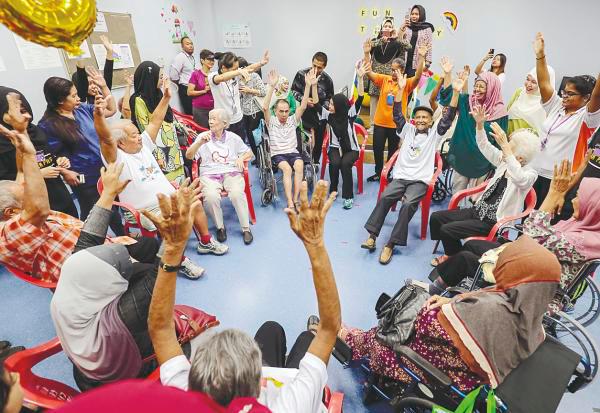ACCORDING to the latest demographic report for the fourth quarter of 2023 by the Statistics Department, Malaysia is experiencing a demographic shift with a steady rise in the number of the older population.
While Malaysia’s total population is projected to reach 41.5 million by 2040, the proportion of the population aged 60 and older is projected to be at 17.6%, representing more than 7.3 million people.
Given this growing older population, Malaysia needs to create sound and sustainable socioeconomic, health and social care systems to cater for this change.
It is only logical that after working most of their lives, the elderly would look forward to retiring in comfort by perhaps travelling or by spending time with family and friends. However, not all are fortunate to have the same luxury due to personal or financial circumstances.
Recently, the news of a 70-year-old man having to work as a food delivery rider to support his family went viral. Despite having reached retirement age and the harsh working conditions as a rider, the elderly man had no choice but to work because of his family’s needs and their daily expenses.
This is not one rare case of an elderly Malaysian having to work as there are many others who are struggling to make ends meet.
When one talks about life after retirement, the main hope is to be financially worry-free – not having to care about money to sustain one’s needs until one dies.
The expectation is that there is an adequate system in place to support a conducive and comfortable or at least decent living for retirees. This should cover basic needs such as sustainable income/revenue, health services, retirement homes and insurance coverage, among others.
Currently, civil servants can either opt for the government pension scheme or contribute to the Employees Provident Fund (EPF), which is largely subscribed by private sector workers.
Nevertheless, when we discuss pensions, it should not be solely about choosing which system is better – between pension and EPF. That approach would be overly simplistic or “lazy” because there are many elements affecting retirees that require consideration including financial security, healthcare, public transport and more. Therefore, this issue should be viewed holistically and thoroughly examined from a broader perspective.
According to a recent statement from the Finance Ministry, pension disbursements for over 900,000 retired civil servants are expected to cost the government over RM31 billion this year.
With the increasing number of retirees and longer life expectancy, this financial “commitment” is expected to skyrocket to RM120 billion by 2040. Therefore, the suggested plan to eliminate pensions for new government employees is deemed a necessary move to alleviate the government’s financial burden.
Irrespective of one’s employment sector, the shared aspiration is to retire peacefully. Yet, at present, numerous uncertainties loom regarding life after retirement, especially concerning financial security and access to healthcare.
To gain a better understanding of retirees’ needs and challenges, the following questions need to be addressed:
How much do I need monthly to meet my needs?
Do I have enough savings to sustain me for the next 15 years?
Is it feasible for me to work to generate income for my daily expenses?
Are there other options besides pension and EPF?
Who will care for me if I become ill?
Given the high cost of healthcare, should I consider obtaining insurance?
I am not married and live alone. What support options are available to me?
Considering I do not own a property, where can I reside?
What factors should I consider when selecting a retirement home suited to my needs?
The Malaysia Ageing and Retirement Survey Wave Two (2021-2022) conducted by the Social Well-being Research Centre at Universiti Malaya in partnership with the Asian Development Bank revealed significant findings.
Over 80% of elderly individuals in Malaysia were not prepared to reside in an assisted living facility, although more than 60% reported at least one doctor-diagnosed disease.
Additionally, a majority of respondents expressed a need for social and financial assistance, with many advocating for government-mandated parental care from their children.
As such, in addressing the issue of retirement, it is vital to recognise that financial security is just one aspect among many to contemplate.
Therefore, it is encouraging to note that the Economy Ministry, in collaboration with the World Bank, is currently developing a national ageing blueprint in preparation for the country’s transition to an “ageing nation” by 2030.
The blueprint will help the government address the impact of an ageing population across multiple areas, encompassing economic growth, productivity, workforce management, social protection and elderly healthcare.
As we formulate our policies, it would be prudent to examine the approaches adopted by other nations regarding retirement planning.
The Mercer CFA Institute Global Pension Index 2023 is an excellent reference for policymakers, offering insights into various pension systems worldwide.
This report, analysing and ranking 47 global pension systems, positions Malaysia at 32nd place. Notably, the Netherlands, Iceland and Denmark are highlighted as having the world’s top-performing pension systems.
Additionally, the report identifies areas for improvement in Malaysia, including household savings/debt management, pension age adjustments and enhanced support for impoverished individuals.
The transition of Malaysia into an ageing nation demands serious attention. Although the challenges are evident, it is reassuring to witness the government’s earnest efforts in formulating policies and action plans to address this issue.
Let us unite in crafting a serene retirement plan for our elderly population.









